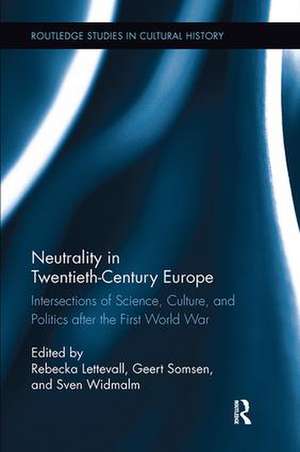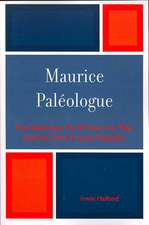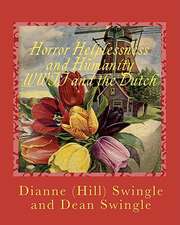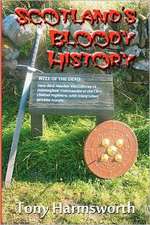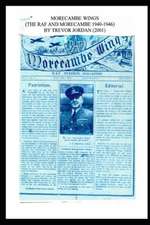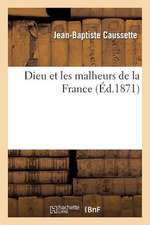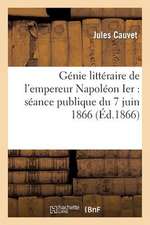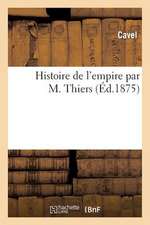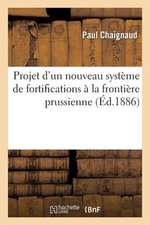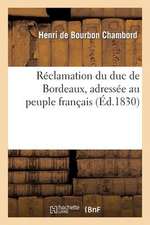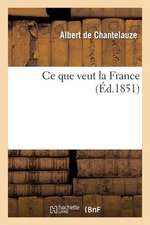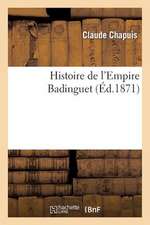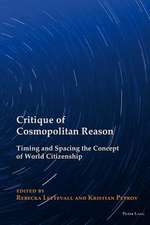Neutrality in Twentieth-Century Europe: Intersections of Science, Culture, and Politics after the First World War: Routledge Studies in Cultural History
Editat de Rebecka Lettevall, Geert Somsen, Sven Widmalmen Limba Engleză Paperback – 24 mai 2017
This book explores how the notion of neutrality has been used and how a neutralist discourse developed in history. None of the contributions take claims of neutrality at face value – some even show how they were made to advance partisan interests. The concept was typically clustered with notions, such as peace, internationalism, objectivity, rationality, and civilization. But its meaning was changeable – varying with professional, ideological, or national context. As such, Neutrality in Twentieth-Century Europe presents a different perspective on the century than the story of the great belligerent powers, and one in which science, culture, and politics are inextricably mixed.
| Toate formatele și edițiile | Preț | Express |
|---|---|---|
| Paperback (1) | 416.22 lei 6-8 săpt. | |
| Taylor & Francis – 24 mai 2017 | 416.22 lei 6-8 săpt. | |
| Hardback (1) | 1068.18 lei 6-8 săpt. | |
| Taylor & Francis – 29 mai 2012 | 1068.18 lei 6-8 săpt. |
Din seria Routledge Studies in Cultural History
-
 Preț: 311.41 lei
Preț: 311.41 lei -
 Preț: 310.45 lei
Preț: 310.45 lei -
 Preț: 310.08 lei
Preț: 310.08 lei -
 Preț: 325.96 lei
Preț: 325.96 lei -
 Preț: 311.41 lei
Preț: 311.41 lei -
 Preț: 311.41 lei
Preț: 311.41 lei -
 Preț: 326.49 lei
Preț: 326.49 lei -
 Preț: 665.25 lei
Preț: 665.25 lei -
 Preț: 315.70 lei
Preț: 315.70 lei -
 Preț: 280.29 lei
Preț: 280.29 lei - 9%
 Preț: 934.83 lei
Preț: 934.83 lei -
 Preț: 325.15 lei
Preț: 325.15 lei -
 Preț: 313.60 lei
Preț: 313.60 lei -
 Preț: 326.78 lei
Preț: 326.78 lei - 9%
 Preț: 276.16 lei
Preț: 276.16 lei -
 Preț: 341.39 lei
Preț: 341.39 lei -
 Preț: 356.84 lei
Preț: 356.84 lei - 30%
 Preț: 848.15 lei
Preț: 848.15 lei - 5%
 Preț: 1290.15 lei
Preț: 1290.15 lei - 30%
 Preț: 849.37 lei
Preț: 849.37 lei - 25%
 Preț: 858.29 lei
Preț: 858.29 lei - 28%
 Preț: 822.34 lei
Preț: 822.34 lei -
 Preț: 438.56 lei
Preț: 438.56 lei - 28%
 Preț: 819.91 lei
Preț: 819.91 lei - 18%
 Preț: 1109.99 lei
Preț: 1109.99 lei - 18%
 Preț: 1055.06 lei
Preț: 1055.06 lei - 18%
 Preț: 1068.18 lei
Preț: 1068.18 lei - 18%
 Preț: 1058.65 lei
Preț: 1058.65 lei - 18%
 Preț: 1057.89 lei
Preț: 1057.89 lei - 18%
 Preț: 1110.74 lei
Preț: 1110.74 lei -
 Preț: 487.02 lei
Preț: 487.02 lei -
 Preț: 412.37 lei
Preț: 412.37 lei - 18%
 Preț: 1115.51 lei
Preț: 1115.51 lei -
 Preț: 489.10 lei
Preț: 489.10 lei -
 Preț: 281.63 lei
Preț: 281.63 lei - 18%
 Preț: 1057.09 lei
Preț: 1057.09 lei - 18%
 Preț: 1055.51 lei
Preț: 1055.51 lei - 28%
 Preț: 820.73 lei
Preț: 820.73 lei - 18%
 Preț: 1110.61 lei
Preț: 1110.61 lei -
 Preț: 431.57 lei
Preț: 431.57 lei - 18%
 Preț: 1054.71 lei
Preț: 1054.71 lei -
 Preț: 397.66 lei
Preț: 397.66 lei - 30%
 Preț: 932.43 lei
Preț: 932.43 lei - 18%
 Preț: 1060.19 lei
Preț: 1060.19 lei -
 Preț: 442.12 lei
Preț: 442.12 lei - 18%
 Preț: 1052.38 lei
Preț: 1052.38 lei
Preț: 416.22 lei
Nou
Puncte Express: 624
Preț estimativ în valută:
79.64€ • 86.78$ • 67.11£
79.64€ • 86.78$ • 67.11£
Carte tipărită la comandă
Livrare economică 23 aprilie-07 mai
Preluare comenzi: 021 569.72.76
Specificații
ISBN-13: 9781138117044
ISBN-10: 1138117048
Pagini: 366
Ilustrații: 28
Dimensiuni: 152 x 229 x 19 mm
Greutate: 0.45 kg
Ediția:1
Editura: Taylor & Francis
Colecția Routledge
Seria Routledge Studies in Cultural History
Locul publicării:Oxford, United Kingdom
ISBN-10: 1138117048
Pagini: 366
Ilustrații: 28
Dimensiuni: 152 x 229 x 19 mm
Greutate: 0.45 kg
Ediția:1
Editura: Taylor & Francis
Colecția Routledge
Seria Routledge Studies in Cultural History
Locul publicării:Oxford, United Kingdom
Public țintă
Postgraduate and UndergraduateCuprins
1. Introduction Rebecka Lettevall, Geert Somsen, and Sven Widmalm Part I: Points of Departure: The breakdown of internationalism in science and culture and its effects 2. Probing the Master Narrative of Scientific Internationalism: Nationals and Neutrals in the 1920s Brigitte Schroeder Part II: International Collaborations: Neutrality in science 3. "Holland’s Calling": Dutch Scientists’ Self-fashioning as International Mediators Geert Somsen 4. "A superior type of universal civilisation": Science as Politics in Sweden, 1917-1926 Sven Widmalm 5. "Has the Swedish Academy of Sciences … seen nothing, heard nothing, and understood nothing?" The First World War, Biased Neutrality, and the Nobel Prizes in Science Robert Marc Friedman 6. Pursuing Common Cultural Ideals: Niels Bohr, Neutrality, and International Scientific Collaboration during the Inter-War Period Henrik Knudsen and Henry Nielsen 7. Caught-up by Politics? The Solvay Councils on Physics and the Trials of Neutrality Kenneth Bertrams 8. The Scientific Construction of Swiss Neutrality Daniel Speich Chassé Part III: Intellectual Positions: Neutrality and Culture 9. A Castle in the Centre: The First Czechoslovak Republic and European Cooperation (1918-1938) Carlos Reijnen 10. Prague Zionism, the Czechoslovak State, and the Rise of German National Socialism: the Figure of Max Brod (1914-1933) Gaëlle Vassogne 11. Legitimacy through Neutrality: Resources of Journalism in the International Press Visit to Sweden in 1923 Patrik Lundell 12. Of Twins and Time: Scientists, Intellectual Cooperation, and the League of Nations Jimena Canales Part IV: Political Visions: Neutrality and Peace 13. Eye-deep in Hell: Heinrich Lammasch, the Confederation of Neutral States, and Austrian Neutrality, 1899-1920 Georg Cavallar 14. Nobel Science of Peace: Norwegian Neutrality, Internationalism and the Nobel Peace Prize Vidar Enebakk 15. Neutrality and Humanitarianism: Fridtjof Nansen and the Nansen Passports Rebecka Lettevall List of Contributors Notes Index
Recenzii
"A stimulating, new look at how scientific values mix with political identities." – Geert Vanpaemel, Katholieke Universiteit Leuven, Belgium
Descriere
Time and again scientists and other intellectuals have claimed their endeavors to be neutral, elevated above the world of partisan conflict and power politics. This volume studies the resonances between neutrality in science and culture and neutrality in politics. By analyzing the activities of scientists, intellectuals, and politicians (sometimes overlapping categories) of mostly neutral nations in the First World War and after, it traces how an ideology of neutralism was developed that soon was embraced by international organizations. This book explores how the notion of neutrality has been used and how a neutralist discourse developed in history. As such, Neutrality in Twentieth-Century Europe presents a different perspective on the century than the story of the great belligerent powers, and one in which science, culture, and politics are inextricably mixed.
